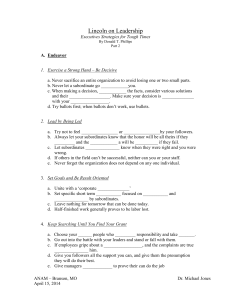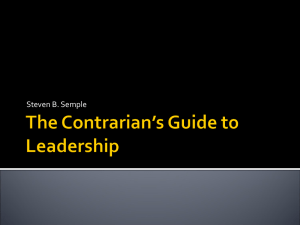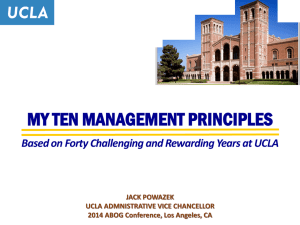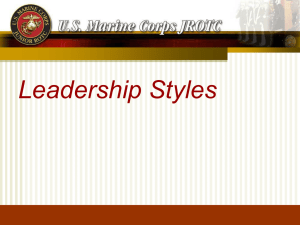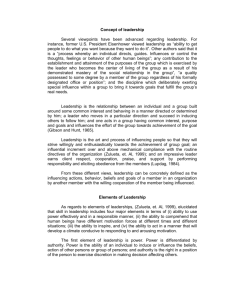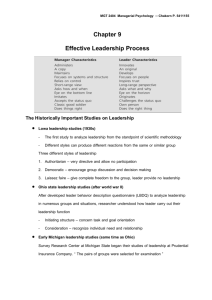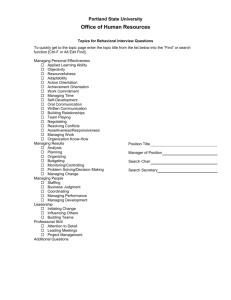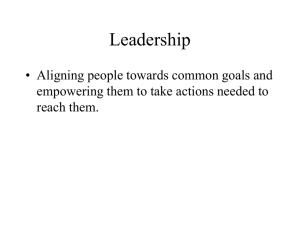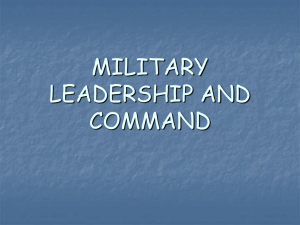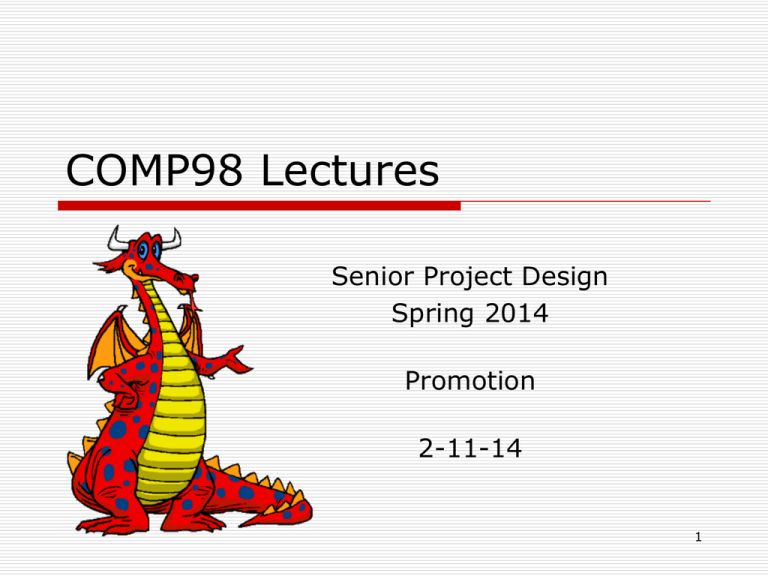
COMP98 Lectures
Senior Project Design
Spring 2014
Promotion
2-11-14
1
Comic for the Day
Think out of the box!
2
Quote for the Day
“The best leader is one whose
existence is barely known. Then,
when the work is done, the people
can say, ‘We did it ourselves.’”
— Lao Tzu
3
Recall: Leadership
Commitment
Passion
Vision
Persistence
Stubbornness
Integrity
People
Confidence
4
Leadership: General Colin
Powell's Rules
It ain't as bad as you think. It will look better in the morning.
Get mad, then get over it.
Avoid having your ego so close to your position that when your
position falls, your ego goes with it.
It can be done!
Be careful what you choose. You may get it.
Don't let adverse facts stand in the way of a good decision.
You can't make someone else's choices. You shouldn't let someone
else make yours.
Check small things.
Share credit.
Remain calm. Be kind.
Have a vision. Be demanding.
Don't take counsel of your fears or naysayers.
Perpetual optimism is a force multiplier
5
Leadership Styles
Vision
Passion and self-sacrifice
Articulate an ideological vision congruent with the deeplyheld values of followers, a vision that describes a better
future to which the followers have an alleged moral right
Display a passion for, and have a strong conviction of,
what they regard as the moral correctness of their vision;
engage in outstanding or extraordinary behavior and make
extraordinary self-sacrifices in the interest of their vision
and mission
Confidence, determination, and persistence
Display a high degree of faith in themselves and in the
attainment of the vision they articulate; have a very high
degree of self-confidence and moral conviction because
their mission usually challenges the status quo and,
therefore, may offend those who have a stake in
preserving the established order
Source: House, R., Podsakoff, P.M., Leadership Effectiveness: Past Perspectives and Future Direction
Research, in Greenberg, J. Organizational Behavior: The State of the Science, Erlbaum, NJ, 1994.
6
Leadership Styles
Image-building
Role-modeling
Self-conscious about their own image; recognize the
desirability of followers perceiving them as competent,
credible, and trustworthy
Followers identify with the values of role models whom
they perceived in positive terms
External representation
Act as spokespersons for their respective organizations
and symbolically represent those organizations to external
constituencies
Source: House, R., Podsakoff, P.M., Leadership Effectiveness: Past Perspectives and Future Direction
Research, in Greenberg, J. Organizational Behavior: The State of the Science, Erlbaum, NJ, 1994.
7
Leadership Styles
Expectations of and confidence in followers
Selective motive-arousal
Selectively arouse those motives of followers that they see
as of special relevance to the successful accomplishment
of the vision and mission
Frame alignment
Communicate expectations of high performance from their
followers and strong confidence in their followers’ ability to
meet such expectations
To persuade followers to accept and implement change;
linkage of individual and leader such that some set of
followers’ interests, values, and beliefs, as well as the
leader’s activities, goals, and ideology, becomes congruent
and complementary
Inspirational communication
Often, but not always, communicate their message in an
inspirational manner using vivid stories, slogans, symbols,
and ceremonies
Source: House, R., Podsakoff, P.M., Leadership Effectiveness: Past Perspectives and Future Direction
Research, in Greenberg, J. Organizational Behavior: The State of the Science, Erlbaum, NJ, 1994.
8
Management Maxims…
Grow or die
No one is smart enough to
be a dictator
The only real power one has
is the power of persuasion
The less you know about
something the simpler it
seems
Important decisions require
at least one night’s sleep
Decisions made without all
the facts are guesses
The most important thing a
manager does is pick the
people
Lies are hard to remember
There is nothing more
critical to true success than
openness, honesty, and
integrity
Those that don’t solicit and
listen to advice are destined
to be unsuccessful
What is given cannot be
taken away
Meddling after responsibility
is delegated and accepted
provides a built-in excuse
for failure
Unwritten agreements are
soon forgotten
Cash flow is more important
that profit
All contracts end
9
Promotion
Part One
10
Everyone has advice…
The only people that are not
making mistakes are those that
are not doing anything
Don’t bite off more than you can
bite off
The most important and most
difficult trait to identify is the
ability to get things done
A manager with a full calendar
every day isn’t delegating
properly
A full day spent in meeting is
40% wasted
A pat on the back is the ultimate
in cost effectiveness
A manager that takes credit for
the work of the troops should be
made a member of the troops
A manager unwilling to take risks
is destined for mediocrity
People that feel comfortable in
their jobs are more productive
The prepared bird gets the worm
An unfilled position is better than
one filled by the wrong person
The killer of the bearer of bad
news quickly joins the ranks of
the uninformed
Business flourishes along lines of
relationships
11
Advertisement for a Management
Seminar
• You will be taught an array of management skills:
planning, organizing, influencing, leading, and
controlling
• Managers spend 80% of their time communicating.
• You will spend 80% of your time speaking and 20%
writing.
• You will learn to combine monetary use with givesomething-back or what we call "spiritual profit."
• You will learn to be a better storyteller. Better leaders tell better stories.
• Better managers generate enthusiasm.
• Management is changing. You will learn the differences between pre-modern,
modern and postmodern management concepts and skills to conduct your green
business.
• You will learn by doing in three phases of a spiritual profit campaign.
• You will learn to work together with people who do not think, dress, act, speak, or
listen the same way as you do.
•You will learn to manage in a diverse world.
•You will become a better global citizen by getting into the real world to learn
12
What is the Truth?
13
Transition to Management –
Study Results (1)
Key finding: “The transition to manager is not
limited to acquiring competencies and building
relationships. Rather, it constitutes a profound
transformation, as individuals learn to think,
feel, and value as managers”
Think
Value
Feel
Source: Hill, Linda A., Becoming a Manager: Mastery of a New Identity, Harvard Business School
Press; 2nd edition, 2003.
14
Transition to Management –
Study Results (2)
Building effective relationships with their subordinates was
unequivocally the most difficult task the new managers
faced
The new managers’ expectations about being a manager
were inaccurate
Inaccurate expectations contributed to the challenge of
becoming a manager since the daily realities of the
manager role caught them by surprise:
The heavy workload
Rather than being organized and calm, things were hectic: more like
firefighting
The realization that they had to get things done through others and
thus were dependant on their subordinates
To produce the results they were accountable for, they had to
develop and assist their subordinates as well as remove obstacles
for their subordinates without taking over
As they assumed formal authority, they were often viewed as the
enemy by their subordinates/former peers
Source: Hill, Linda A., Becoming a Manager: Mastery of a New Identity, Harvard Business School
Press; 2nd edition, 2003.
15
Transition to Management –
Study Results (3)
The new managers were promoted for technical
competence but were now in a role where managing
people was the primary skill:
The importance of understanding and motivating people
The need for communication skills
The challenge of dealing with subordinates who covered a
wide performance range from marginal to outstanding
Learning to delegate was perhaps the most difficult
challenge the new managers faced in managing
subordinates’ performance
The decision to move into management caused the
participants some anxiety; they pondered the change
and the significance it held in their careers
The new managers had to deal with a lot of stress and
emotions.
Source: Hill, Linda A., Becoming a Manager: Mastery of a New Identity, Harvard Business School
Press; 2nd edition, 2003.
16
Origins of Engineering
Latin – ingenium – a talent, natural capacity, or clever
invention
Engineer and ingenious come from the same root
Webster’s 3rd International Dictionary:
A calling requiring specialized knowledge and often
long and intensive preparation including instruction in
skills and methods as well as in the scientific,
historical, or scholarly principles…
Engineer’s Council
The profession in which knowledge of the
mathematical and natural sciences gained by study,
experience, and practice is applied with judgment to
develop ways to utilize, economically, the materials
and forces of nature for the benefit of humankind
17
What does it mean to be an
Engineer?
Design things
Math and science
Innovation
Professional
Life long learning
Technology
Projects
Specifications
18
Why is it important?
Credibility
Respect
Logical mind
Organize chaos
Problem-solving
Expertise
Discipline
Innovation and Design
19
What is Management?
“Being a respected
and responsible
representative of the
company to your
subordinates”
“Getting things done
through people”
“The means by which
the organization
grows or dies”
“Ability to achieve
effective
accomplishments
from others toward a
common business
objective”
“Delivering a quality
product or service
that customers value”
“Organizing and
coordinating a
profitable effort
through good
decision-making and
people motivation”
“The overall
planning, evaluating,
and enforcement that
delivers profit”
“Keeping customers happy”
“Directing the actions
of a group to
accomplish a desired
objective”
20
Classification of Management
First-line
Directly supervises non-managers (individual contributors)
Responsible for carrying out plans and objectives of higher management
Make short-range operating plans
Recently appointed to position
Indirect managers – manage people through other managers
Make intermediate plans to achieve long term goals set by higher level
management
Establish departmental polices and evaluate performance of subordinate work
units and their managers
Integrate and coordinate various functions or groups with different short term
objectives
Middle
Top
Responsible for defining the character, vision, mission, and objectives of the
enterprise
Define long range plans and objectives
Evaluate the performance of departments and readiness for promotion of key
managers
Establish criteria for success
21
Skills vs. Management Level
First-line
Middle
Top
Technical Skills
Interpersonal Skills
Conceptual Skills
22
A Manager’s Impact on the
Organization
Infrastructure
Polices/procedures/rewards
Communication
7%
Leadership
Day-to-day
Communication
61 %
Formal Media
Meetings/memos/Intranet
Communication
32 %
23
Organization Power: Getting
Results
Bases of power
as:
Coercive
Rewardbased
Institutional
Referent
Expert
Physical
attraction
People respond positively to physical
stature and good looks managers
can exert more influence over their
coworkers with good grooming,
posture, speech and dress
24
What do Managers Do?
Interpersonal Roles
Figurehead
Leader
Liaison
Monitor
Disseminator
Spokesman
Entrepreneurial
Disturbance handler
Resource allocator
Negotiator
Informational Roles
Decisional Roles
Source: Mintzberg, H., The Nature of Managerial Work, Harper-Collins, 1973.
25
Interpersonal Roles
Figurehead – ceremonial or symbolic head
of an organization; outwardly directed
relationship
Leader – downward relationship of
selecting, guiding, and motivating
subordinates
Liaison – horizontal relationship with peers
and people in the organization, built and
nurtured for mutual assistance
26
Informational Roles
Monitor – collecting information about internal
operations and external events; reviews activities, read
reports, attends professional conferences and trade
shows to understand future trends (if a researcher
performs this role, it is as a gatekeeper)
Disseminator – transmits information internally to
subordinates, superiors, and peers to make sure all have
the data to do their jobs
Spokesman – (normally by higher management)
speaks for the organization to the press, public, or other
external groups [Note: an internal version of this role
might be an ombudsman or advocate – successful
supervisors “grab it by the horns” to get resources or
rewards for their subordinates]
27
Decisional Roles
Entrepreneurial – initiating change, assuming risk,
and transforming ideas and knowledge into useful
product, services or other tangible assets
Disturbance handler – dealing with unforeseen
problems or crises and resolving them
Resource allocator – distributing (precious)
resources of money, labor, materials, and equipment to
optimize the productivity of the organization
Negotiator – bargaining with suppliers or customers
or subordinates or peers or superiors to obtain
agreements favorable to the enterprise (or for at least
the portion of it within the scope of responsibility)
28
What is the Function of a Manager?
Planning – selects the missions and objectives and
the actions to achieve them
Decision-making – choosing the future course of
action from among several alternatives
Organizing – establishing the infrastructure and roles
Leading – influencing people to strive willingly and
enthusiastically toward a particular goal
Controlling – measurement and corrective action of
activities or processes of subordinates to ensure the
desired intermediate milestones are reached and the
desired final results are achieved
29
What is Engineering Management?
Distinguished from other types of managers due to
technical functions
Ability to apply engineering principles and
organize and direct people and projects
Management of technical functions or
broader functions in a high-technology enterprise
Source: Babcock, D.L., Morse, L.C., Managing Engineering and Technology, 3 rd Ed., Prentice-Hall, 2002.
30
Engineering Management -- MUSTS
Really understand the business (company and
industry)
Understand the technology driving today’s
business and the technology that will
change the business
Treat research and development as an
investment to be nurtured, rather than expense to
be minimized
Dedicated to solving the customer’s problem
Spend time on strategic thinking
Regard innovation as the premier objective
Source: Babcock, D.L., Morse, L.C., Managing Engineering and Technology, 3 rd Ed., Prentice-Hall, 2002.
31
Spheres of Influence
Management
•Operations
•Industrial
•Plant
•Marketing
•Finance
•Customer Service
•Advertising
•Sales
Business
Engineering
Management
•Production
•Project Management
•Product Design &
Development
•Research
•Advance Technology
•Design
•Research
•Verification &
Validation
•Manufacturing
Engineering
32
Management – The Black Vulture
Beware of
the politics
Beware of
the prize
Understand
the sacrifice
Understand
what you
need to do
33
Management – The White Dove
Inspiring
others
Watching
others
achieve
The ultimate
coach
Win-win
34
Management – The Shades of Gray
It doesn’t come in two flavors…
35
What are you looking for?
36
Thought for the Day
37
Promotion
Part Two
38
Self Awareness & Evaluation
What does my life look like? What do I want it to look like?
How do I want my day-to-day life to be?
How do I need to interact with other people?
What sacrifices do I need/want to make for my career?
Who will be affected by those sacrifices besides me?
What perception do others have of me?
What specifically would I like to learn during my life?
How much money will I need? When will I need it by to do
the things I want to do?
Are my career expectations realistic? Aligned with the
company?
Are my career expectations achievable on my current path?
Where would I like to be in 2 years, 10 years, 20 years?
39
What are Your Priorities?
Please rank the following in order of priority:
Title
Position
Power
Family
Money
Time
Ego
Hobbies
Friends
Are they really you?
40
Have You Thought About Your
Career…Or Did You Just Take a Job?
Did you look into the industry? Do you know it?
Is Your Company Growing? Staying the same? Falling?
What are your expectations! Are they being managed? If
so, by whom?
Do you really know where your job might take you?
What skills do you need in your job? What are your
strengths?
Does your company provide a conducive environment for
career growth? How fast are individuals promoted? Do
you know the ground rules?
What do they know that you don’t?
How do you rise through the organization?
How do you control your destiny?
41
The Common Fallacy
The best performers make the best
managers WRONG!
Management requires different:
Skill sets
Performance measures
Comfort zone
Level of control
Delegation
Listening and probing
Ability to smile – all the time
42
Career stages
Stage 1 – learning from others what they have
learned from experience
Stage 2 – produce significant results
independently
Stage 3 – assume some responsibility for
directing other people and projects
Stage 4 – influence on organizational direction
Innovator, entrepreneur, leader, visionary, manager
43
The Management Coaching Model
Where the employee wants to be
Understanding what aspects need to be develop
Defining the requirements of the job
Planning to acquire the capabilities the job
requires
Where the employee is now
Self-awareness – a sense of personal strengths
and weaknesses
Areas most critical to future progress
How the employee might progress
Perseverance and motivation to reduce the “gap”
Opportunities within and without to reach the goal
44
Career Choices
An engineer may:
Remain loyal to the profession
Changing career
Vacillate about changing careers
Transition to management
Become a manager
For each choice:
What are the options?
What are the requirements?
What is the level of comfort?
45
Are You Management Material?
Do you display superior technical competency?
Are you able to demonstrate a proven track record
of organizational and management skills
Are you able to demonstrate a proven track record
of leadership achieving results?
Are you able to demonstrate superior
communications skills?
Do you like visibility and exposure?
Do you like loneliness?
Are you mobile?
46
Capabilities for Leadership
Cognitive
Analysis, synthesis, and evaluation of data sets
Maturity
Understand one’s own emotions, values, handle upset, ambiguity,
and loneliness
Development
Knowledge of one’s limitations, accept criticism, accept new
challenges, learn and grow
Influence
Ability to persuade, convince individuals to act in your interests;
prevent them from implementing agendas contrary to your own
Leadership
Inspire others to overcome obstacles to achieve a shared goal
Integration
Build effective team and incorporate all parts of the organization
Insight
Understand the motivations of others and their behavior
Expertise
Technical skills in one’s own discipline for respect in the profession
External
Awareness and adaptation to changes in the external environment
Organizational
Building the infrastructure to achieve the desired objectives
Decisiveness
Ability to take action or facilitate the actions of others for the
achievement of critical short and long-tem goals
47
Integrated Skills Matrix
Functional
Excellence
Programs
First Line
Management
Leading
From
the Middle
Strategic
Leadership
Executive
Programs
Global
Leadership
Programs
International
Consortium
Program
Business
Leadership
Operational
Leadership
People
Leadership
Personal
Leadership
Define the Different Skills Needed at Each Level
Adapted from Boeing Integrated Competency Model
48
CC040045.09
For example: Boeing Expectations
of Leaders
Develop Yourself
Integrity
Judgment & Perspective
Continuing Learning
Communication &
Influence
Adaptability
Develop Your Team
Teamwork & Collaboration
Vision & Alignment
Leading Change
Building Talent
Grow the Business
Customer Success
Flawless Execution
Business Knowledge
Adapted from Boeing Integrated Competency Model
49
For example: Boeing Competency
Model
Business Leadership
Operational Leadership
Demonstrating Vision
Using Sound Judgment
Shaping Strategy
Driving Execution
Aligning the Organization
Driving Continuous Improvement
Thinking Globally
Working Cross-Functionally
Applying Financial Acumen
People Leadership
Personal Leadership
Inspiring and Empowering
Influencing and Negotiating
Adapting
Inspiring Trust
Attracting & Developing Talent
Fostering Teamwork &
Collaboration
Leading Courageously
Driving for Stakeholder Success
Building Relationships
Fostering Effective
Communication
Adapted from Boeing Integrated Competency Model
50
CC040045.08
Copyright © 2002 The Boeing Company - All Rights Reserved
Promotion Criteria (1)
Able to influence
Autonomy (freedom to act)
Communications
Articulate in a variety of media and situations
Customers
Company
Superiors
Peers and subordinates
Demonstrated capability
Depth and breath of experience
Varied assignments
Different functional areas
Business divisions / units
Global / international
Project leader
Product development
Education
Innovation
51
Promotion Criteria (2)
Interpersonal
Impact
How often
Impact if mistakes are made
Who and what level are contacts
Knowledge and expertise
Liaison
In group
Outside of group
In company
Outside of company
Problem complexity
Presentation
Skills and abilities
Type of experience
Value to the company (contribution)
52
Promotion Criteria (3)
Leadership
Organize people
Reach an objective
Develop enthusiasm
for a cause
Maintain discipline
Deliver bad news
Make it happen
Develop people
Talent building skills
Decision-making
Leadership
Visionary
Collaboration
Within group
With other functions
With other divisions
External with partners
External with
customers
Leader of:
Individual contributors
Project team
Leaders
53
What are the levels of management
(at a Fortune 500 company)?
Chairman
CEO
Sr VP or GM
• Global
• Partners
VP of R&D
• Product labs
• Technology labs
Director R&D
• Product groups
• Technology groups
Manager, R&D
Design
•
•
•
•
•
System engineering
Design
Models
Reliability
Human Factors
Manager, R&D
Technology
•
•
•
•
•
Advance research
New technology
Intellectual Property
Acquisition
Academic liaison
Manager, R&D
Test
Manager, R&D
Support
•
•
•
•
•
•
•
•
•
Test and Evaluation
Regulatory
Compliance
Design review
Laboratories
Sustaining
Customer interface
Field Support
Manufacturing support
54
The Entry Levels
Knowledge and autonomy are the key
differentiators
Ph.D. Degree – Expertise of craft, project / skills
integration, process / investigation ability, autonomy
Master’s Degree – Deep knowledge of craft, skills
integration, project experience, refined process
Bachelor’s Degree – Knowledge of craft, some skills
integration, limited project experience, some process
55
The Definitions
Leader – one who is in charge or in
command of others
Manager, managerial, management –
handling of priorities, controls budgets and
resources, directs the activities of a business
Technical – Special skill or practical
knowledge especially in a technology,
scientific, or business field
Project – an undertaking requiring complex
task, concerted effort, and periodic reporting
Administrative – related tasks, activities, and
projects associated with the performance of
a specific function
56
Individual Contributor (Entry)
Work is directed
Projects are assigned
Decisions are approved
Typical assignments:
Component research
Parts selection
Interface design
Module design
57
Individual Contributor (Veteran)
Work is directed / autonomy dependent
upon seniority
Projects are assigned
Decisions are approved
Typical assignments:
System engineering
Product architecture
Module architecture and design
Mentoring / guidance / supervision of entry level
engineers
58
Mentor / Supervisor
Work is divided among:
Project
Technical
Managerial
No direct reports
Coaching includes technical development and project /
process oversight
Maybe intermediate step toward management
May assign work / schedule time for technicians who
reports to same manager
May work on several projects at the same time
providing oversight and expertise to project engineers
59
Project Leader / Manager
Work is divided among:
Project
Technical
Managerial
May or may not have direct reports
Transition is occurring:
Less time with time
More time with other managers
Amount of technical work is deciding factor
At some point the technical work drops below
50 %
60
Manager / Executive
Project
Managerial
Administrative / budget
Present / operational is focus of work
May or may not have profit / loss
(P&L) responsibility
Manages a group of people in a
particular function or with a specific
product / technology specialty
61
Executive
Responsibilities:
P&L
Product platform or product family or technology
family
Product life cycle ownership – “Cradle to grave”
Product and technology strategies / roadmaps
More internal focus than external focus, but
is aware of external happenings and
impacts
More project focus than business focus
62
Senior Executive
Administrative / budget
Managerial
Strategic / external
Future / planning
Has a business focus – typically global
responsibility
Strong technology integration – acquisition
oriented to reduce cycle times
Responsible for several product families or
related technologies for an industry
segment
63
Words of Warning
Good engineers are not inherently good managers
Challenge is to inspire difficult personalities
To work with you
To work as a team
Beware of management responsibility over staff that are senior
to you, peers, “wanna bees” and personal friends
Understand when to accept the transition to management
Some should not do it at all
Some do it too early in their career
Everyone will not be happy as a manager
Everyone will not always be happy
Balancing work responsibility with personal responsibilities
(family and personal time) is the key to success
If family problems, company responsibilities will add unnecessary
stress and strain
You can always get another job, but not another family
64
Free Advice – What is it Worth?
Find a mentor
Seek advice form someone who has been there successfully
Read books on the subject to get a diversity of ideas and
suggestions
Continue to Learn
Develop diversity and breadth of understanding in all aspects of
your job, company, industry
Test the waters to gain experience
Volunteer for leadership jobs in clubs and organizations
Engineering, marketing, accounting, contracts and purchasing, supply
chain, quality assurance, manufacturing and test
Very good on the job
Excellent networking opportunities
Build all different relationships
Advertises your reputation
Volunteer for unique projects – that no one wants – at your company
and deliver a successful result
Always make sure you get credit and broadcast the news
65
Delegation is the Key for Success
Identify the reason that the task needs to be done
Define the objectives
Set the priority and urgency
Identify and define decision-making scope and authority
Define the problem to be solved
Define what success looks like
State when progress reports need to be submitted:
To whom, when, how
Explain how you will guide, monitor, and take corrective
action
Identify resources: people, time, budget
Define who is impacted
State what happens after the work is completed
Define the standards for quality
66
Conquer the Fear
Fact: You delegate, you lose control
Guide, monitor, and correct – don’t tell
them how to do it
Learn to trust by asking questions
Ask for a plan
Think of all the things you got away
with…they are not stupid…you need to
watch…and keep them on track
Don’t be insulting…but manage as you
would guide children
67
How to get Promoted
Manage expectations (customer, your management,
family and friends
Pick the right people for your team
Probably the most important aspect of the job
Learn how to read personalities and in an interview
A position is better vacant than filled by the wrong person
Remove deadwood
Written, oral, briefings, presentations, impromptu
opportunities
Learn to communicate effectively with a wide range of
people
Earn respect; don’t expect it to be given to you
There is no substitute for integrity
A reputation can be lost in seconds that has taken years to
be built
68
What is the Real Truth?
69
NAY
70
It is Not About YOU
It
It
It
It
It
It
is
is
is
is
is
is
about
about
about
about
about
about
what you have done
who you are
how people relate to you
how who you know
how people feel about you
how often you SMILE
71
Don’t let your career stall before it
gets off the ground
Decide to feel differently about your job
Be empathetic, rather than linear
Be clear on where you want to be
Visualize the path forward
Do an outstanding job in your current position
Be passionate and do exceptionally well
Market yourself within your company
Market yourself by marketing everyone else
Redouble your efforts to develop relationships with
new people
Meet with others to listen and learn about them; once
every two weeks is 26 new people per year
72
Job Promotion is About
Relationships
It is about getting it done through
people
It is about knowing who you can depend
upon to get it done for you
It is about knowing who to call to get
the information
It is about knowing who to call to open
the door
It is about knowing who you can trust
73
In Summary
Perform your work beyond reproach
Form real relationships
Lead by example, not dictation
Ask questions and listen
Take risks and make mistakes
Pick people and take care of them
Set goals and inspire
Keep smilin’
74
Parting Quote
“Few have the primary
imagination…the ability to give initial
impulse, and the unselfishness to
withdraw and let others take
credit…This is of course the great
secret of getting things done in the
world”
— Harvey Cushing
75

